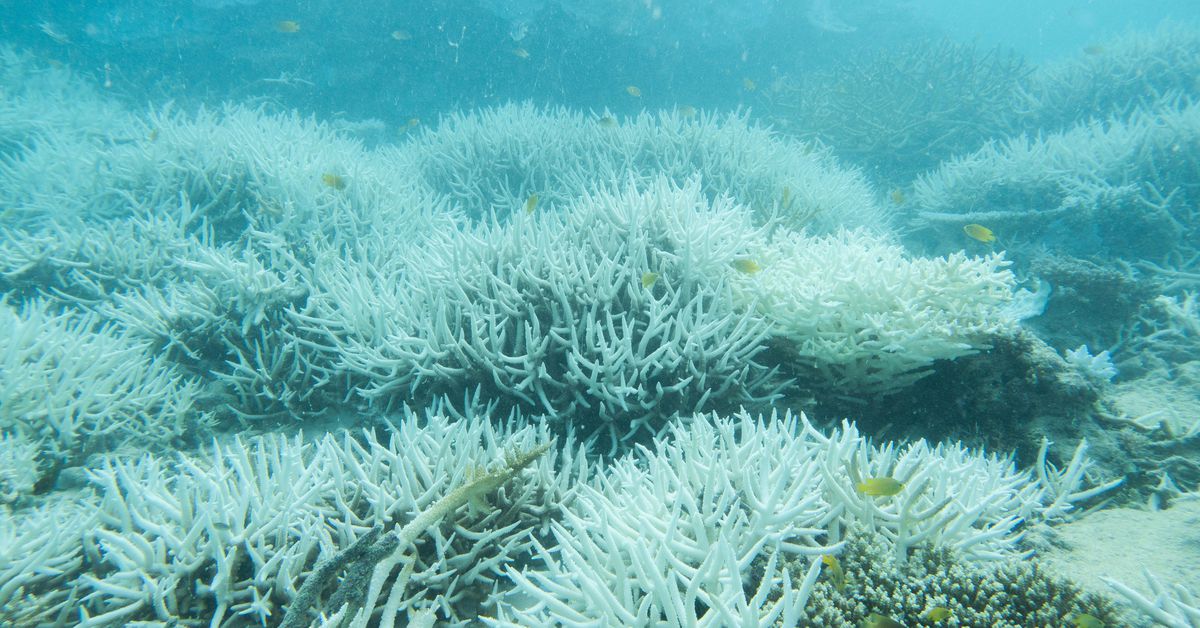/cdn.vox-cdn.com/uploads/chorus_asset/file/25563132/image_9.jpeg)
The Great Barrier Reef and surrounding waters have reached hotter temperatures over the past decade than they have in at least 400 years because of climate change, according to new research published in the journal Nature.
It’s a stark warning. The survival of the Great Barrier Reef is essentially now in human hands. Corals around the world face near extinction if temperatures continue to rise with the world running primarily on fossil fuels.
“The reef is in danger.”
“The reef is in danger, and if we don’t divert from our current course, our generation will likely witness the demise of one of Earth’s great natural wonders, the Great Barrier Reef,” Benjamin Henley, lead author of the research and a lecturer at the University of Melbourne and an honorary fellow at the University of Wollongong, said in a Tuesday press briefing.
Corals are animals that secrete calcium carbonate skeletons that form reefs. The skeletons of corals that can grow for centuries allowed Henley and his coauthors to look into the past. As they grow, they form bands that scientists can study like tree rings. They contain chemical signatures that show heat stress in certain years. The ratio of strontium to calcium and the oxygen isotope ratio in particular relate to the temperature of the water at the time the corals were still growing.
There isn’t consistent data on sea surface temperatures from direct measurements prior to 1900. But the researchers were able to combine what data was available from direct measurements with data from skeleton core samples to build a statistical model that they then used to reconstruct temperatures going back to the 1600s. They focused on temperatures between January and March when waters surrounding Australia’s Great Barrier Reef tend to be the hottest.
That’s how they discovered that those periods in 2024, 2020, and 2017 reached the highest temperatures in four centuries. 2024 has been the most remarkable, roughly 1.73 degrees Celsius above the reconstructed average between 1618 and 1899.
Under heat stress, corals will expel the algae that give them nutrients and color. It’s a phenomenon called bleaching, and the corals can die from it over time. If temperatures linger roughly 1 degree Celsius above what’s “normal” for the summer for more than two months, they can trigger mass coral bleaching events, according to a related article on the research published in Nature.
The past year has marked the world’s fourth global coral bleaching event on record — wreaking havoc on reefs around the world and even triggering a race to temporarily relocate coral nurseries to land to try to save them. Global bleaching events also took place in 1998, 2010, and between 2014 and 2017.
Coral skeleton cores the researchers assessed showed hardly any stress bands before 1980, a sign that mass bleaching events were far less likely before then. Using climate models to look at potential outcomes with and without human influence, the authors of the paper conclude that “human influence on the climate system is responsible for the rapid warming in recent decades.”
Policies currently in place to slash greenhouse gas emissions from fossil fuels still aren’t enough to stop things from getting much worse. Global average temperatures are still on track to rise between 2 to 3 degrees Celsius higher than they were before the industrial revolution. Previous research has estimated that even a two-degree rise could be enough to wipe out 99 percent of the world’s coral reefs.
The Great Barrier Reef in particular faces the prospect of bleaching every year in the near future, coauthor and professor of marine studies at the University of Queensland Ove Hoegh-Guldberg said in the press briefing. “It’s very, very worrying to know that we’re quite close to [that] point, and I think this will happen in the next 10 years,” Hoegh-Guldberg said. While corals can survive bleaching, reefs generally need one or two decades to recover from severe mass bleaching, according to the related article.
With all of that in mind, every fraction of a degree of global warming that we can avoid by turning more swiftly to clean energy can make a difference for the world’s coral reefs. Some corals may be better at adapting to a warmer world than others, ensuring the survival of the reef even if it’s less biologically diverse than it was in the past.
“We need to believe in it if we’re going to keep it going,” Hoegh-Guldberg said. “It is possible … if we take the right level of action on greenhouse gasses and we seek out and protect corals that have a good chance of surviving this type of scenario, then we will set us up for a future with coral reefs.”
Services Marketplace – Listings, Bookings & Reviews
